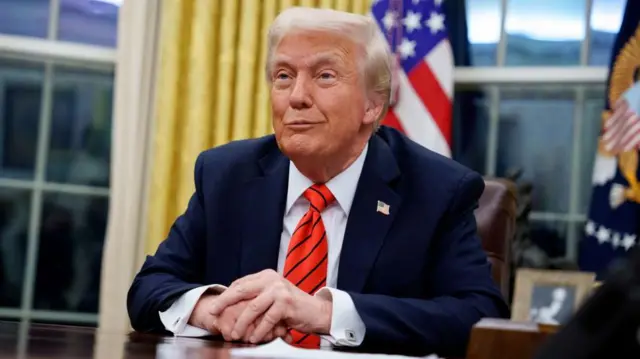Former President Donald J. Trump announced during a Cabinet meeting on Thursday a potential strategy to engage major law firms—referred to informally by administration sources as “Trump Trade Firms”—to assist in negotiating future trade deals and leasing matters. The firms under consideration have already entered into financial settlements with the administration and may now be tapped for their legal expertise in advancing the U.S. trade agenda.
“We may as well use them,” Trump said, referring to prominent law firms including Paul Weiss, Perkins Coie, and Covington & Burling, which have collectively paid on average $100 million—some as high as $125 million—in agreements related to prior executive orders issued by the former President. These orders had previously restricted certain firms from participating in federal government work due to what the administration called “inappropriate past activities.”
Describing them as “great firms, the best, the biggest, really the most prestigious,” Trump suggested that these firms, now financially linked to the administration, could support U.S. efforts in complex trade matters. “We’re going to try and use these very prestigious firms to help us out with the trade because, you know, we have a lot of countries,” he stated.
The announcement adds momentum to what insiders are calling the Trump Trade Firms approach—leveraging outside private sector legal power to complement governmental resources in economic negotiations. Trump cited logistical challenges in sourcing trade attorneys internally, noting, “I don’t think Attorney General Pam Bondi will be happy if I ask her to send over 200 lawyers that work on trade… she’s focused on criminal stuff.”
The former President added a personal note of humor, saying, “Hopefully, I won’t need that many legal fees… but if I do, it’s not going to be pleasant,” while also hinting at future needs post-office.
This move comes in the context of recent executive orders that have restricted access for certain firms—including Susman Godfrey LLP, which called the order “unconstitutional”—while clearing others to work with the administration after settling. The evolving landscape has prompted legal challenges from some firms, such as Perkins Coie and WilmerHale, which have obtained temporary restraining orders in D.C. federal court.
Earlier this week, Trump also proposed using these firms to support coal companies with leasing negotiations. “We’ll use some of those people… I think they’re going to do a fantastic job,” he said at a White House meeting with coal industry representatives.
As Trump’s administration continues to redefine the intersection between private sector law expertise and national economic interests, the Trump Trade Firms model may mark a new era in how trade negotiations are staffed and executed.



